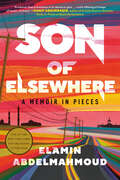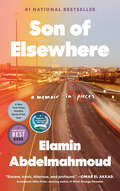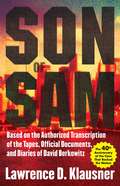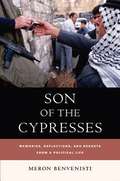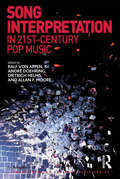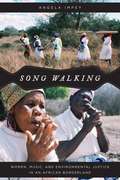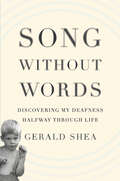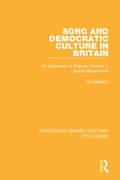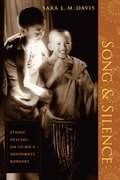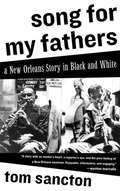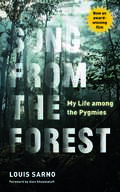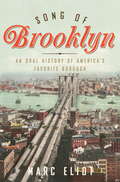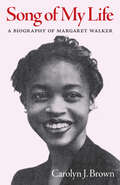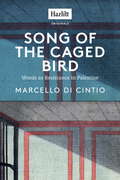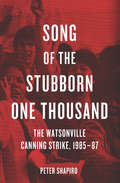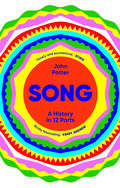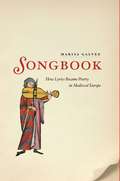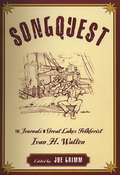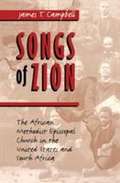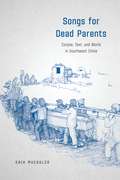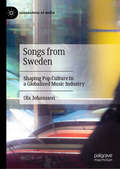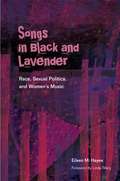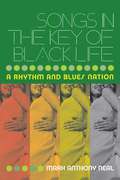- Table View
- List View
Son of Elsewhere: A Memoir in Pieces
by Elamin AbdelmahmoudAn enlightening and deliciously witty collection of essays on Blackness, faith, pop culture, and the challenges—and rewards—of finding one&’s way in the world, from a BuzzFeed editor and podcast host.&“A memoir that is immense in its desire to give . . . a rich offering of image, of music, of place.&”—Hanif Abdurraqib, author of A Little Devil in America: Notes in Praise of Black PerformanceONE OF THE MOST ANTICIPATED BOOKS OF 2022—The MillionsAt twelve years old, Elamin Abdelmahmoud emigrates with his family from his native Sudan to Kingston, Ontario, arguably one of the most homogenous cities in North America. At the airport, he&’s handed his Blackness like a passport, and realizes that he needs to learn what this identity means in a new country. Like all teens, Abdelmahmoud spent his adolescence trying to figure out who he was, but he had to do it while learning to balance a new racial identity and all the false assumptions that came with it. Abdelmahmoud learned to fit in, and eventually became &“every liberal white dad&’s favorite person in the room.&” But after many years spent trying on different personalities, he now must face the parts of himself he&’s kept suppressed all this time. He asks, &“What happens when those identities stage a jailbreak?&” In his debut collection of essays, Abdelmahmoud gives full voice to each and every one of these conflicting selves. Whether reflecting on how The O.C. taught him about falling in love, why watching wrestling allowed him to reinvent himself, or what it was like being a Muslim teen in the aftermath of 9/11, Abdelmahmoud explores how our experiences and our environments help us in the continuing task of defining who we truly are. With the perfect balance of relatable humor and intellectual ferocity, Son of Elsewhere confronts what we know about ourselves, and most important, what we&’re still learning.
Son of Elsewhere: A Memoir in Pieces
by Elamin AbdelmahmoudFrom one of the most beloved media personalities of his generation comes a one-of-a-kind reflection on Blackness, faith, language, pop culture, and the challenges and rewards of finding your way in the world.Professional wrestling super fandom, Ontario's endlessly unfurling 401 highway, late nights at the convenience store listening to heavy metal—for writer and podcast host Elamin Abdelmahmoud, these are the building blocks of a life. Son of Elsewhere charts that life in wise, funny, and moving reflections on the many threads that weave together into an identity. Arriving in Canada at age 12 from Sudan, Elamin's teenage years were spent trying on new ways of being in the world, new ways of relating to his almost universally white peers. His is a story of yearning to belong in a time and place where expectation and assumptions around race, faith, language, and origin make such belonging extremely difficult, but it's also a story of the surprising and unexpected ways in which connection and acceptance can be found. In this extraordinary debut collection, the process of growing—of trying, failing, and trying again to fit in—is cast against the backdrop of the memory of life in a different time, and different place—a Khartoum being bombed by the United States, a nation seeking to define and understand itself against global powers of infinite reach. Taken together, these essays explore how we pick and choose from our experience and environment to help us in the ongoing project of defining who we are—how, for instance, the example of Mo Salah, the profound grief practices of Islam, the nerdy charm of The O.C.'s Seth Cohen, and the long shadow of colonialism can cohere into a new and powerful whole. With the perfect balance of relatable humor and intellectual ferocity, Son of Elsewhere confronts what we know about ourselves, and most important, what we&’re still learning.
Son of Sam: Based on the Authorized Transcription of the Tapes, Official Documents, and Diaries of David Berkowitz
by Lawrence Klausner40th ANNIVERSARY OF THE CASE THAT ROCKED THE NATION Discover the harrowing true story of the notorious serial killer who terrorized New York City forty years ago during the summer of 1977—David Berkowitz, otherwise known as Son of Sam—for true crime fans and viewers of The Lost Tapes: Son of Sam documentary now on the Smithsonian Channel.Son of Sam recounts the incredible, “can’t miss” (Kirkus Reviews) story of how a single man killed six innocent people, wounded several others, and sent millions of New Yorkers into a panic from July 1976 through August 1977. It is also the story of the greatest manhunt in the history of the New York Police Department—the intimate narrative of the men assigned to tracking down a lone killer who prowled supposedly safe neighborhoods and randomly shot pretty young women with his .44-caliber revolver. The police task force investigated more than 3,000 suspects while politicians watched a city fall into panic. Yet the interest didn’t fade after an arrest was made, and the criminal justice system showed itself incapable of coping with the man who committed such horrendous crimes. Now, based on more than three hundred recorded conversations between David Berkowitz and psychiatrists, police, district attorneys, and his defense counsel, along with his own handwritten notes and diaries, as well as the accounts of the survivors and the families of victims, this chilling book thoroughly explores the full horror of Son of Sam.
Son of the Cypresses: Memories, Reflections, and Regrets from a Political Life
by Meron Benvenisti Maxine Kaufman-Lacusta Michael Kaufman-Lacusta"Now that I am seventy years of age, it is my prerogative to offer a summing up," says Meron Benvenisti, internationally known author and columnist, Jerusalem native, and scion of Israel's founders. Born in Palestine in 1934 to a Sephardic father and an Ashkenazi mother, Benvenisti has enjoyed an unusual vantage point from which to consider his homeland's conflicts and controversies. Throughout his long and provocative career as scholar, elected official, and respected journalist, he has remained intimately involved with Israel's social and political development. Part memoir and part political polemic,Son of the Cypresses threads Benvenisti's own story through the story of Israel. The result is a vivid, sharply drawn eyewitness account of pre-state Jerusalem and Israel's early years. He memorably sets the scene by recalling his father's emotional journey from Jewish Salonika in 1913 to Palestine, with all its attendant euphoria and frustration, and his father's pioneer dedication to inculcating Israeli youth with a "native's" attachment to the homeland. In describing the colorful and lively Jerusalem in which he grew up, Benvenisti recalls the many challenges faced by new Jewish immigrants, who found themselves not only in conflict with the Arab population but also with each other as Sephardim and Ashkenazim. He revisits his own public disagreements with both Zionists and Palestinians and shares indelible memories such as his boyhood experiences of the 1948 War. In remembering his life as an Israeli sabra, Benvenisti offers a vivid record of the historical roots of the conflict that persists today.
Song Interpretation in 21st-Century Pop Music (Ashgate Popular and Folk Music Series)
by Allan Moore André Doehring Ralf AppenExisting books on the analysis of popular music focus on theory and methodology, and normally discuss parts of songs briefly as examples. The impression often given is that songs are being chosen simply to illuminate and exemplify a theoretical position. In this book the obverse is true: songs take centre stage and are given priority. The authors analyse and interpret them intensively from a variety of theoretical positions that illuminate the song. Thus, methods and theories have to prove their use value in the face of a heterogeneous, contemporary repertoire. The book brings together researchers from very different cultural backgrounds and encourages them to compare their different hearings and to discuss the ways in which they make sense of specific songs. All songs analysed are from the new millennium, most of them not older than three years. Because the most widely popular styles are too often ignored by academics, this book aims to shed light on how million sellers work musically. Therefore, it encompasses a broad palette, highlighting mainstream pop (Lady Gaga, Ke$ha, Lucenzo, Amy McDonald), but also accounting for critically acclaimed ’indie’ styles (Fleet Foxes, Death Cab for Cutie, PJ Harvey), R&B (Destiny’s Child, Janelle Monae), popular hard rock (Kings of Leon, Rammstein), and current electronic music (Andrés, Björk). By concentrating on 13 well-known songs, this book offers some model analyses that can very easily be studied at home or used in seminars and classrooms for students of popular music at all academic levels.
Song Walking: Women, Music, and Environmental Justice in an African Borderland (Chicago Studies in Ethnomusicology)
by Angela ImpeySong Walking explores the politics of land, its position in memories, and its foundation in changing land-use practices in western Maputaland, a borderland region situated at the juncture of South Africa, Mozambique, and Swaziland. Angela Impey investigates contrasting accounts of this little-known geopolitical triangle, offsetting textual histories with the memories of a group of elderly women whose songs and everyday practices narrativize a century of borderland dynamics. Drawing evidence from women’s walking songs (amaculo manihamba)—once performed while traversing vast distances to the accompaniment of the European mouth-harp (isitweletwele)—she uncovers the manifold impacts of internationally-driven transboundary environmental conservation on land, livelihoods, and local senses of place. This book links ethnomusicological research to larger themes of international development, environmental conservation, gender, and local economic access to resources. By demonstrating that development processes are essentially cultural processes and revealing how music fits within this frame, Song Walking testifies to the affective, spatial, and economic dimensions of place, while contributing to a more inclusive and culturally apposite alignment between land and environmental policies and local needs and practices.
Song Without Words: Discovering My Deafness Halfway through Life
by Gerald Shea<P>Much has been written about the profoundly deaf, but the lives of the nearly 30 million partially deaf people in the United States today remain hidden. Song without Words tells the astonishing story of a man who, at the age of thirty-four, discovered that he had been deaf since childhood, yet somehow managed to navigate his way through Andover, Yale, and Columbia Law School, and to establish a prestigious international legal career. <P>Gerald Shea's witty and candid memoir of how he compensated for his deafness--through sheer determination and an amazing ability to translate the melody of vowels. His experience gives fascinating new insight into the nature and significance of language, the meaning of deafness, the fierce controversy between advocates of signing and of oral education, and the longing for full communication that unites us all.
Song and Democratic Culture in Britain: An Approach to Popular Culture in Social Movements (Routledge Library Editions: Folk Music #11)
by Ian WatsonOriginally published in 1983. Song has always been a natural way to record everyday experiences – an expression of celebration, commiseration, complaint and protest. This innovative book is a study of popular and working-class song combining several approaches to the subject. It is a history of working-class song in Britain which concentrates not simply on the songs and the singers but attempts to locate such song in its cultural context and apply principles of literary criticism to this essentially oral medium. It triggered controversy: some critics castigated its Marxist approach, others enthused that ‘such unabashed partisanship amply reveals the outstanding characteristic of Watson's book’. The author discusses the way in which the popular song, from Victorian times onwards, has been forced by the entertainment industry out of its roots in popular culture, to become a blander form of art with minimal critical potential. The book ends by considering the possibilities for a continued flourishing of a genuine popular song culture in an electronic age. It has become a standard title in bibliographies and curricula. Much has changed since 1983, not least in music; but this then innovative book still has a lot to say about popular song in its social and historical context.
Song and Silence: Ethnic Revival on China's Southwest Borders
by Sara DavisIn the sunny, subtropical Sipsongpanna region, Tai Lues perform flirtatious, exoticized dances for an increasingly growing tourist trade. Endorsed by Chinese officials, who view the Tai Lues as a "model minority," these staged performances are part of a carefully sanctioned ethnic policy. However, behind the scenes and away from the eyes and ears of tourists and the Chinese government, a different kind of cultural resurgence is taking place.In this vivid and beautifully told ethnography, Sara L. M. Davis reveals how Tai Lues are reviving and reinventing their culture in ways that contest the official state version. Carefully avoiding government repression, Tai Lues have rebuilt Buddhist temples and made them into vital centers for the Tai community to gather, discuss their future, and express discontent. Davis also describes the resurgence of the Tai language evident in a renewed interest in epic storytelling and traditional songs as well as the popularity of Tai pop music and computer publishing projects. Throughout her work, Davis weaves together the voices of monks, singers, and activists to examine issues of cultural authenticity, the status of ethnic minorities in China, and the growing cross-border contacts among Tai Lues in China, Thailand, Burma, and Laos.
Song for my Fathers
by Tom SanctonSong for My Fathers is the story of a young white boy driven by aconsuming passion to learn the music and ways of a group of agingblack jazzmen in the twilight years of the segregation era.Contemporaries of Louis Armstrong, most of them had played in localobscurity until Preservation Hall launched a nationwide revival ofinterest in traditional jazz. They called themselves "the mens." Andthey welcomed the young apprentice into their ranks. The boy was introduced into this remarkable fellowship by hisfather, an eccentric Southern liberal and failed novelist whose powerfularticles on race had made him one of the most effective polemicistsof the early Civil Rights movement. Nurtured on his father's belief inracial equality, the aspiring clarinetist embraced the old musicianswith a boundless love and admiration. The narrative unfolds againstthe vivid backdrop of New Orleans in the 1950s and '60s. But thatmagical place is more than decor; it is perhaps the central player, forthis story could not have taken place in any other city in the world.
Song from the Forest
by Alex Shoumatoff Michael Obert Louis SarnoAs a young man, American Louis Sarno heard a song on the radio that gripped his imagination. With some funding from musician Brian Eno, he followed the mysterious sounds all the way to the Central African rain forest and found their source with the Bayaka Pygmies, a tribe of hunters and gatherers. Nothing could have prepared him for life among the Pygmies, a people legendary for their short stature and musical wealth. Sarno never left.Considered outwardly lazy by some, scrounging, and near alcoholic, the Pygmies Sarno met had seemingly lost all desire to hunt or make music. Only after he had lived with them for some time (on a diet of tadpoles) was he allowed to join them in the rain forest where they still in relative harmony with nature. There Sarno experienced the extraordinary beauty and spiritual sophistication of their culture and the supreme importance of music as the principal means by which they communicate with the rain forest and its magical spirits.Over the decades Sarno has recorded more than 1,000 hours of unique Bayaka music. He is a fully accepted member of the Bayaka society and married a Bayaka woman. Permanently changed by his experience and captivated by a Bayaka culture, In Song from the Forest Sarno has chronicled his attempt to protect the fragile existence of the Pygmies in an increasingly destructive world.Once, when his son, Samedi, became seriously ill and Sarno feared for his life, he held his son in his arms through a frightful night and made him a promise: "If you get through this, one day I'll show you the world I come from." Now the time has come to fulfill his promise.In a new major documentary film, Sarno tells the story of the Bayaka as he travels with Samedi from the African rain forest to another jungle, one of concrete, glass, and asphalt: New York City. Together, they meet Louis' family and old friends, including his closest friend from college, Jim Jarmusch. Carried by the contrasts between rainforest and urban America, and a fascinating soundtrack, Louis' and Samedi's stories are interwoven to form a touching portrait of an extraordinary man and his son. SONG FROM THE FOREST is a modern epic film set between rainforest and skyscrapers.
Song of Brooklyn: An Oral History of America's Favorite Borough
by Marc EliotA captivating oral portrait of America's favorite borough, in the words of those who know Brooklyn best -- Mel Brooks, Spike Lee, Arthur Miller, Joan Rivers, Norman Mailer, Cousin Brucie, Maria Bartiromo, Pete Hamill, and many other current and former inhabitants. Gathers the oral testimony of 100 Brooklynites past and present, famous and unknown, about a mythic borough that is also an indisputably real place. They speak eloquently of what it was like back then, when the Dodgers played in Ebbets Field; later, when the borough fell on hard times; and now, when it has come back on the tracks of a real-estate boom, giving it celebrity chic and hipster cred. The story of Brooklyn is one of the great and still ongoing chapters of the American urban experience.
Song of My Life: A Biography of Margaret Walker
by Carolyn J. BrownMargaret Walker (1915–1998) has been described as “the most famous person nobody knows.” This is a shocking oversight of an award-winning poet, novelist, essayist, educator, and activist as well as friend and mentor to many prominent African American writers. Song of My Life reintroduces Margaret Walker to readers by telling her story, one that many can relate to as she overcame certain obstacles related to race, gender, and poverty. Walker was born in 1915 in Birmingham, Alabama, to two parents who prized education above all else. Obtaining that education was not easy for either her parents or herself, but Walker went on to earn both her master's and doctorate degrees from the University of Iowa. Walker's journey to become a nationally known writer and educator is an incredible story of hard work and perseverance. Her years as a public figure connected her to Richard Wright, Langston Hughes, Alex Haley, and a host of other important literary and historical figures. This biography opens with her family and those who inspired her—her parents, her grandmother, her most important teachers and mentors—all significant influences on her reading and writing life. Chapters trace her path over the course of the twentieth century as she travels to Chicago and becomes a member of the South Side Writers' Group with Richard Wright. Then she is accepted into the newly created Master of Fine Arts Program at the University of Iowa. Back in the South, she pursued and achieved her dream of becoming a writer and college educator as well as wife and mother. Walker struggled to support herself, her sister, and later her husband and children, but she overcame financial hardships, prejudice, and gender bias and achieved great success. She penned the acclaimed novel Jubilee, received numerous lifetime achievement awards, and was a beloved faculty member for three decades at Jackson State University in Jackson, Mississippi.
Song of the Brook
by Matilda NordtvedtIn this fascinating sequel to Secret in the Maple Tree we follow Hilda and her family from their home on a Minnesota farm to a country place near Bellingham, Washington. Hilda becomes envious of the grandeur of their relatives' home and life style until she realizes how satisfying her simple joys are: listening to the brook, talking to God by her window, exploring the woods with John, and doing something original for the closing program at school.
Song of the Caged Bird
by Marcello Di CintioFor political readers and anyone invested in the Israeli-Palestinian conflict, Marcello Di Cintio's Song of the Caged Bird is a refreshing look at Palestinian resistance--through literature and the power of books. When Marcello Di Cintio began teaching at the Palestine Writing Workshop in Ramallah, he avoided making reference to the occupation in his assignments at first--to see if his students addressed it on their own--and he soon learned that it touches all aspects of Palestinian life. Curious how Palestinian literature could operate with its people so tied to a single narrative, Di Cintio began a journey through the Palestinian world of books: from the monument to the poet Mahmoud Darwish to the volumes in the Nablus Prisoners' library; from one of the West Bank's most successful bookshops to a century-old library in Jerusalem run by a family with a lineage in that city many centuries older. What he found is a world of identity and resistance that is considerably more complex--and potentially more hopeful--than what we see splashed across our screens.
Song of the Stubborn One Thousand: The Watsonville Canning Strike, 1985-87
by Peter ShapiroOn September 9, 1985, one thousand mainly Mexican women workers in Watsonville, California, the "frozen food capital of the world," were forced out on strike in response to an attempt by Watsonville Canning owner, Mort Console, to break their union. They returned to work eighteen months later. Not one had crossed the picket line. A moribund union has been revitalized, and Watsonville's Latino majority emerged as a major force in local politics.At a time when organized labor was in headlong retreat, the Watsonville Canning strike was a dramatic show of the power of women workers, whose struggle became a rallying point for the Chicano movement.Apart from its sheer drama, the strikers' story illuminates the challenges facing a group of ordinary working people who waged a protracted and ultimately successful struggle against seemingly insurmountable odds.
Song: A History in 12 Parts
by John PotterFrom one of our most innovative singers, a vibrant history of song stretching from Hildegard von Bingen and Benjamin Britten to Björk &“Songs can be intensely personal (whether you hear them or sing them) and none of us would choose the same twelve songs as anyone else. My choices are based on decades of performing experience in many different genres, but I hope they will reveal aspects of our common humanity as the story evolves from the Middle Ages to the present.&” In this celebratory account, author and singer John Potter tells the European story of song. The form has captivated audiences and excited performers for centuries, from the music of the troubadours and the Christian liturgy through classical composers such as Bach and Schumann up to Britten, Berio, and the rise of popular music. Choosing twelve key works, Potter offers a personal tour through this vital tradition, from John Dowland&’s &“Flow My Tears&” to George Gershwin&’s &“Summertime.&” Throughout, he reveals who wrote and sang these joyful masterpieces—and what they mean to singers and audiences today.
Songbook: How Lyrics Became Poetry in Medieval Europe
by Marisa GalvezToday we usually think of a book of poems as composed by a poet, rather than assembled or adapted by a network of poets and readers. But the earliest European vernacular poetries challenge these assumptions. Medieval songbooks remind us how lyric poetry was once communally produced and received—a collaboration of artists, performers, live audiences, and readers stretching across languages and societies. The only comparative study of its kind, Songbook treats what poetry was before the emergence of the modern category “poetry”: that is, how vernacular songbooks of the thirteenth to fifteenth centuries shaped our modern understanding of poetry by establishing expectations of what is a poem, what is a poet, and what is lyric poetry itself. Marisa Galvez analyzes the seminal songbooks representing the vernacular traditions of Occitan, Middle High German, and Castilian, and tracks the process by which the songbook emerged from the original performance contexts of oral publication, into a medium for preservation, and, finally, into an established literary object. Galvez reveals that songbooks—in ways that resonate with our modern practice of curated archives and playlists—contain lyric, music, images, and other nonlyric texts selected and ordered to reflect the local values and preferences of their readers. At a time when medievalists are reassessing the historical foundations of their field and especially the national literary canons established in the nineteenth century, a new examination of the songbook’s role in several vernacular traditions is more relevant than ever.
Songquest: The Journals of Great Lakes Folklorist Ivan H. Walton (Great Lakes Books Series)
by Ivan H Walton Laurie Sommers Joe GrimmIvan H. Walton was a pioneering folklorist who collected the songs and stories of aging sailors living along the shores of the Great Lakes in the 1930s. His collection is unique in the annals of Great Lakes folklore. It began as a search for songs but broadened into a collection of weather signs, shipboard beliefs, greenhorn tales, and stories of the intense rivalry between sailors and the steamboat men who replaced them. Edited by Joe Grimm, Songquest: The Journals of Great Lakes Folklorist Ivan H. Walton is a selection from the daily journals Walton wrote during his travels as a folklore collector. <P><P> It is clear that Walton, a professor of English at the University of Michigan, both admired the sailors of the Great Lakes for what they had done during their working years and worried about them as they entered the twilight of their lives. Walton went beyond the songs he set out to find and captured the pitch and roll of the Great Lakes alive with white-winged schooners. His writings provide a clear picture of the colorful individuals he met and interviewed-captains, cabin boys, tugmen, chandlers, boardinghouse owners, dredgers, and light keepers. Walton also documented the methods he used and recorded his personal thoughts about his nomadic life and the events going on around him during the 1930s, including the Great Depression, Franklin D. Roosevelt's election, and the end of Prohibition. <P><P> Songquest is a companion volume to Windjammers: Songs of the Great Lakes Sailors (Wayne State University Press, 2002), which contains the lyrics from more than a hundred of Walton's collected songs, as well as musical scores, sketches, and a compact disc of field recordings.
Songs Of Zion: The African Methodist Episcopal Church In The United States And South Africa
by James T. CampbellSongs of Zion focuses on the African Methodist Episcopal Church, black America's oldest and largest independent church. Campbell charts the origins and evolution of African American independent churches, arguing that the very act of becoming Christian
Songs for Dead Parents: Corpse, Text, and World in Southwest China
by Erik MuegglerIn a society that has seen epochal change over a few generations, what remains to hold people together and offer them a sense of continuity and meaning? In Songs for Dead Parents, Erik Mueggler shows how in contemporary China death and the practices surrounding it have become central to maintaining a connection with the world of ancestors, ghosts, and spirits that socialism explicitly disavowed. Drawing on more than twenty years of fieldwork in a mountain community in Yunnan Province, Songs for Dead Parents shows how people view the dead as both material and immaterial, as effigies replace corpses, tombstones replace effigies, and texts eventually replace tombstones in a long process of disentangling the dead from the shared world of matter and memory. It is through these processes that people envision the cosmological underpinnings of the world and assess the social relations that make up their community. Thus, state interventions aimed at reforming death practices have been deeply consequential, and Mueggler traces the transformations they have wrought and their lasting effects.
Songs from Sweden: Shaping Pop Culture in a Globalized Music Industry (Geographies of Media)
by Ola JohanssonSongs from Sweden shows how Swedish songwriters and producers are the creative forces behind much of today’s international pop music. As Ola Johansson reveals, the roots of this “music miracle” can be found in Sweden’s culture, economy, and thriving music industry, concentrated in Stockholm. While Swedish writer-producers developed early global recognition for making commercially successful pop music, new Swedish writer-producers have continuously emerged during the last two decades. Global artists travel to Stockholm to negotiate, record, and co-write songs. At the same time, Swedish writer-producers are part of a global collaborative network that spans the world. In addition to concrete commercial accomplishments, the Swedish success is also a result of the acquisition of reputational capital gained through positive associations that the global music industry holds about Swedish music. Ultimately, pop songs from Sweden exhibit a form of cultural hybridity, drawing from both local and global cultural expressions.
Songs from the Loom: A Navajo Girl Learns to Weave
by Susan BraineIn this unique series, Native American authors examine their cultural traditions, from Navajo rug weaving in the Southwest to wild rice gathering in northern Minnesota. Each book describes these customs as they are seen through the eyes of the participants and discusses how Native American people maintain their cultural identities in contemporary society.
Songs in Black and Lavender: Race, Sexual Politics, and Women's Music
by Eileen M. Hayes Linda TilleryDrawing on fieldwork conducted at eight women's music festivals, Eileen M. Hayes shows how studying these festivals--attended by predominately white lesbians--provides critical insight into the role of music and lesbian community formation. She argues that the women's music festival is a significant institutional site for the emergence of black feminist consciousness in the contemporary period. Hayes also offers sage perspectives on black women's involvement in the women's music festival scene, the ramifications of their performances as drag kings in those environments, and the challenges and joys of a black lesbian retreat based on the feminist festival model. With acuity and candor, longtime feminist activist Hayes elucidates why this music scene matters. Veteran vocalist, percussionist, producer, and cultural historian Linda Tillery provides a foreword.
Songs in the Key of Black Life: A Rhythm and Blues Nation
by Mark Anthony NealIn Songs in the Key of Black Life, acclaimed cultural critic Mark Anthony Neal turns his attention to Rhythm and Blues. He argues that R&B-often dismissed as just a bunch of love songs, yet the second most popular genre in terms of sales-can tell us much about the dynamic joys, apprehensions, tensions, and contradictions of contemporary black life, if we listen closely. With a voice as heartfelt and compelling as the best music, Neal guides us through the work of classic and contemporary artists ranging from Marvin Gaye to Macy Gray. In the first section of the book, Rhythm, he uses the music of Meshell N'degeocello, Patti Labelle, Jill Scott, Alicia Keys, and others as guideposts to the major concerns of contemporary black life-issues such as gender, feminist politics, political activism, black masculinity, celebrity, and the fluidity of racial and sexual identity. The second part of the book, Blues, uses the improvisational rhythms of black music as a metaphor to examine currents in black life including the public dispute between Cornel West and Harvard President Lawrence Summers and the firing of BET's talk-show host Tavis Smiley. Songs in the Key of Black Life is a remarkable contribution to the study of black popular music, and valuable reading for anyone interested in how race is lived in America.
